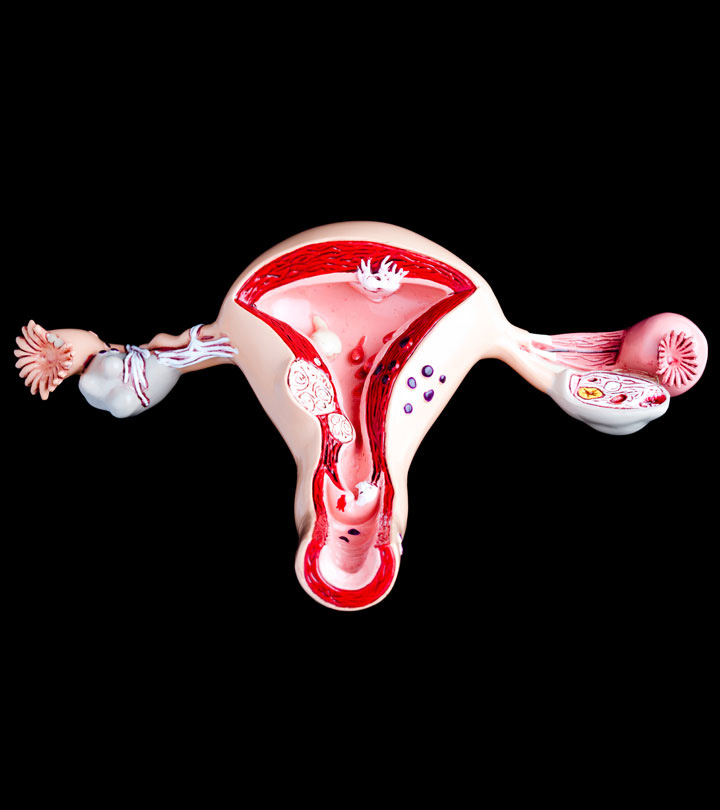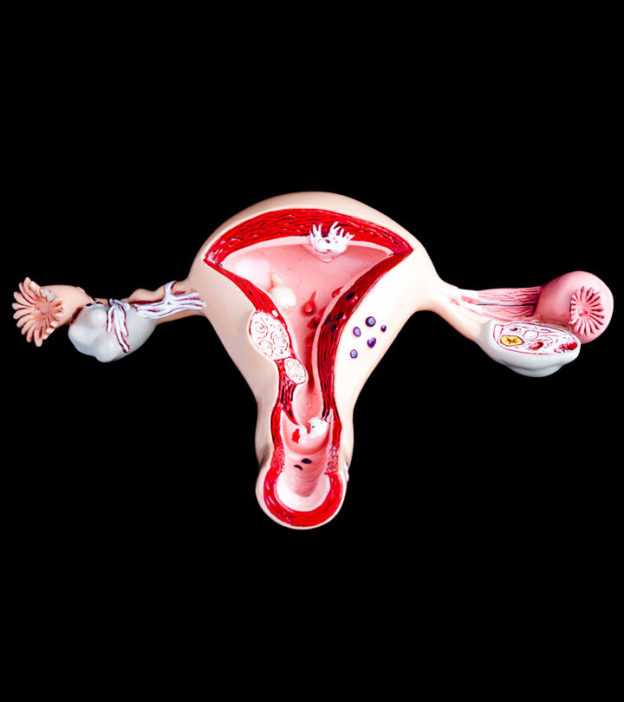

The endometrium is the tissue that normally lines the uterus or womb. Endometriosis is a disorder when the tissue similar to the endometrium grows outside the uterus and on the other areas of the body. The following post discusses endometriosis and pregnancy and how the condition impacts fertility, pregnancy, and the baby.
Endometriosis is most commonly found on the ovaries, fallopian tubes, outer surface of the uterus, and on the tissues that hold the uterus in its place. It may also appear on the vagina, vulva, bowel, bladder, or rectum. It rarely appears on other body parts such as skin, lungs, or brain. It is believed to affect more than 11% of women between the ages 15 and 44 (1).
Causes Of Endometriosis
The exact cause of endometriosis is unknown. However, some possible factors that may cause endometriosis in women are (1) (2):
- Retrograde menstruation: It is characterized by some endometrial tissue flowing up through the fallopian tubes and embedding on to the organs in the pelvis instead of leaving the body as a menstrual flow.
- Problems with the immune system: A weak immune system may not identify and destroy endometrial tissue that grows outside the uterus. As a result, women with endometriosis may present with certain cancers and immune system disorders.
- Hormones: High estrogen levels can promote endometriosis. However, more research is needed to establish the role of a woman’s hormone system in causing endometriosis.
- Surgery: Endometrial tissue may be picked up and can be moved to other areas accidentally during an abdominal surgery such as a hysterectomy or cesarean section (C-section), leading to endometriosis.
- Bodily fluids: Endometrial cells may also spread to the woman’s body through blood or lymph.
Risk Factors For Endometriosis
The following are the suspected risk factors for endometriosis (1) (3):
- Family history
- Early menarche
- Heavy or painful periods
- Short menstrual cycles (less than 27 days)
- Long periods (longer than one week)
- Allergies, such as food allergies, eczema, or hay fever
- Obesity
- Exposure to toxins
Symptoms Of Endometriosis
The symptoms of endometriosis can vary from one woman to another. While some women may have hardly noticeable symptoms, other women might experience severe pain that can hamper going to school or work. The symptoms of endometriosis may include (2) (3).
- Painful menstrual periods
- Pelvic pain (pain in lower tummy or back) that usually worsens during periods
- Pain during or after sex
- Ovulation pain
- Pain in the lower back or thighs
- Pain while using bowel (bowel symptoms)
- Pain while peeing (bladder symptoms)
- Reduced fertility
- Nausea
- Lethargy
- Premenstrual symptoms
- Feeling sick or experiencing constipation, diarrhea, or bloody urine during periods.
- Heavy menstrual flow
- Problems with conception
Endometriosis may also lead to feelings of depression in women.
Stages Of Endometriosis
According to the American Society of Reproductive Medicine, endometriosis is classified into the following stages based on the location, amount, depth, and size of endometrial tissue (4) (5).
| Stage 1 (1-5 points) |
|
| Stage 2 (6-15 points) |
|
| Stage 3 (16-40 points) |
|
| Stage 4 (>40 points) |
|
The spread of the endometrial tissue, involvement of the pelvic structures by the disease, extent of pelvic adhesion, and the blockage of the fallopian tubes are specific criteria that help in grading the stages of endometriosis.
The stage of endometriosis does not necessarily mean the level of pain, other symptoms, or the probability of infertility a woman would experience. For instance, a woman in stage one can have tremendous pain, while stage four can be completely asymptomatic (4).
Impact Of Endometriosis On Fertility
Although endometriosis impacts a woman’s chance of getting pregnant, most women with mild endometriosis are not infertile. Around 70% of women with mild to moderate endometriosis get pregnant without any medical intervention.
While the exact link between infertility and endometriosis is unknown, the severity of the condition and the location of the endometrial tissue also plays a role in determining the outcome. It is important to know that even with severe endometriosis, natural conception is possible (6).
Impact Of Endometriosis On Pregnancy And Baby
Most women with endometriosis have a normal pregnancy, and no extra monitoring or special care is needed. However, the doctor will monitor your blood pressure.
Women with endometriosis may be at a slightly higher risk of developing the following complications (6) (7).
- Bleeding towards the end of pregnancy.
- Placenta previa (low-lying placenta)
- Ectopic pregnancy
- Low birth weight
- Preterm delivery
Endometriosis may improve during pregnancy, due to no periods, but it might recur and cause problems with conceiving again (7).
Diagnosis Of Endometriosis
The doctor will ask for a detailed medical history to exclude other possible causes for the symptoms. Typical symptoms of endometriosis and pain that do not improve with usual medicines for menstrual pain may indicate the presence of endometriosis.
The following tests may help confirm the diagnosis (3) (4).
- Laparoscopy is a surgical procedure done under general anesthesia to examine the pelvic organs. The collected sample is sent for biopsy to determine the location, extent, and size of endometrial growths.
- An ultrasound scan uses sound waves to create a video image of the pelvic organs by pressing a transducer against the abdomen externally or inserting the probe into the vagina.
- Colonoscopy is done under sedation, wherein a medical probe with a camera is attached to examine the bowel. It will check if endometriosis is affecting the bowel.
- Blood tests may be useful in later stages of endometriosis.
- CT scan uses a combination of x-rays and computer technology to produce images of any abnormalities present in the body. A CT scan may help get images that X-rays cannot.
- The combination of x-rays and computer technology to produce images are used to know about any abnormalities present in the body. A CT scan may help to get images that X-rays cannot.
- MRI scan is a non-invasive procedure that produces a two-dimensional view of any internal organs or structures.
It is impossible to diagnose endometriosis during the internal examination, and the doctor may refer you to a gynecologist.
Treatment For Endometriosis
The treatment for endometriosis depends on the extent of the disease, symptoms, past medical history, overall health, tolerance for certain medicines and procedures, and your desire to have children. Endometriosis may be treated with medicines, surgery, or both (8).
Medicines for endometriosis (4)
1. Pain killers
Nonsteroidal anti-inflammatory drugs (NSAIDs), such as ibuprofen or other OTC drugs are used for pain relief.
2. Hormonal medications
- Oral contraceptives, with estrogen and progesterone help prevent ovulation and reduce menstrual flow.
- Progestin-only medications
- Gonadotropin-releasing hormone (GnRH) agonists stop ovarian hormone production and thereby create a sort of “medical menopause”
- Danazol, a synthetic derivative of the male sex hormone testosterone
Surgical correction for endometriosis (4)
3. Laparoscopy
A thin tube with a lens and a light is inserted into the abdominal cavity by making a small incision in the abdominal wall. The doctor will then remove the endometrial growths.
4. Laparotomy
The more extensive surgery removes the maximum possible endometrium, with minimum damage to the healthy tissue.
5. Hysterectomy
It is a procedure to remove the uterus and possibly along with the ovaries or fallopian tubes (9). It is recommended when all other treatments do not work. Heavy periods, pelvic pain, prolapse of the uterus, ovarian cancer, cervical cancer, uterine cancer, etc., are some reasons that may indicate the need for hysterectomy (10).
6. Bowel surgery
This may be recommended if endometriosis has developed in the bowel wall. (3)
Prevention Of Endometriosis
While prevention of endometriosis is not entirely possible, you can reduce your chances of developing endometriosis by lowering the estrogen hormone levels in your body.
The following measures could help (1).
- Ask your doctor if you can use hormonal birth control methods such as pills, rings, or patches with low estrogen doses.
- Exercising regularly for at least four hours a week can help you lower your body fat percentage levels. A low-fat diet and regular exercise help decrease the amount of estrogen in the circulating blood.
- Avoid consuming alcohol in large amounts as it can raise estrogen levels. You should not consume more than one drink per day if you choose to consume alcohol.
- Avoid more than one drink of caffeine-rich liquids such as tea, coffee, and sodas to raise estrogen levels.
Complementary And Alternative Medicine For Endometriosis
Some women may find natural therapies helpful in treating endometriosis. However, as there is no medical evidence to support these claims, you should contact your healthcare provider before considering or using any of these therapies.
The following therapies can help treat some endometriosis symptoms (3).
- Herbal medicines: Herbs such as Chinese herbs, homeopathy, ayurvedic medicines, and naturopathy may offer relief from endometriosis pain (11).
- Traditional Chinese massage: Tui Na, the traditional Chinese massage, focuses on grasping and pulling certain muscles and offers relief from pain (12).
- Nutritional therapies: Diet plans low in fat and high in fiber aid in reducing estrogen (13).
- Yoga practice: Yoga helps in reducing chronic pelvic pain that arises from endometriosis. Yoga helps women with endometriosis achieve a better quality of life (14).
1. Does surgery or having a laparoscopy increase my chances of getting pregnant?
If endometriosis is causing problems with conceiving, surgical removal of the tissue can improve your chances of pregnancy (6).
2. Does pregnancy cure endometriosis?
No, pregnancy may temporarily suppress the symptoms of endometriosis but does not cure it at its root. The symptoms usually reappear after childbirth or cessation of breastfeeding (15).
3. Does endometriosis increase the risk of having a miscarriage?
Miscarriage occurs in around one in five pregnancies. However, the risk increases to one in four pregnancies (16).
4. Does endometriosis increase the risk of ectopic pregnancy?
While around one in 80 to 100 pregnancies end up as ectopic pregnancy, the risk is more than doubled in women with endometriosis (16).
5. How can I prevent miscarriage with endometriosis?
Endometriosis may increase the risk of miscarriage. You can only prevent miscarriage with endometriosis treatment. In most cases, surgery is recommended. However, you may consult your doctor to know what procedure suits you the best (17).
6. Does endometriosis affect egg quality?
Studies show that endometriosis can adversely affect the oocyte quality, hampering its ability to complete maturation and undergo fertilization (18).
7. Can endometriosis destroy an ovary?
Deep ovarian endometriosis may destroy ovarian tissue, leading to premature ovarian failure. This may cause problems with ovulation and ovarian functions (19).
8. Is IVF possible with endometriosis?
Some women with endometriosis may have successful pregnancies with IVF. However, if you experience repeated IVF failures, it may affect you physically, emotionally, and financially. In such cases, doctors may recommend getting your endometriosis treated for successful results (20).
Endometriosis can have a great impact on a woman’s mental well-being. Those who experience severe pain might know that endometriosis can be a life-changing and debilitating condition, especially for women trying to conceive. If you feel anxious or depressed due to endometriosis, you may seek help from a healthcare provider.
References:


Leave a Reply